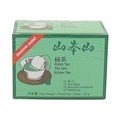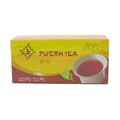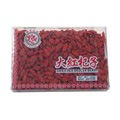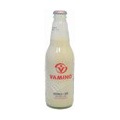Chinese Health Foods
Western nutritionist are frequently turning east for tips on healthy eating. As we enter the new year, we review some of the potential health benefits of the well-publicised foods as well as introduce some foods that may be on the nutritionists’ radars in the future.
Green Tea
 Green tea is frequently touted as a source of antioxidants. Antioxidants have been found to soak up free-radicals in the body, which cause cells to age and in some studies, have been linked to the likelihood of developing certain cancers.
Green tea is frequently touted as a source of antioxidants. Antioxidants have been found to soak up free-radicals in the body, which cause cells to age and in some studies, have been linked to the likelihood of developing certain cancers.
Despite coming from the same plant, green teas have a higher number of antioxidants than black and red teas because of the way that the tea leaves have been processed after being picked. Rather than being fermented like other teas, Green teas are steamed. This means that less of these antioxidants are destroyed or converted into other, less effective compounds, thus making a healthier tea.
In addition to the benefits stated above, green tea is reputed to:
- Restrict the build up of cholesterol in the blood
- Aid in controlling high blood pressure
- Help to lower blood sugar levels, which can help with people with diabetes
- Have antibacterial effects, which can help against infection
- Help to alleviate rheumatoid arthritis
- Aid with weight loss
- Boost the immune system
Some have postulated that white tea is even more effective at providing antioxidants.
Pu-Erh Tea
 Also known as: Pu’Erh tea, Puer tea, Po lai tea, Po nee tea, Pu-er tea, Puerh tea
Also known as: Pu’Erh tea, Puer tea, Po lai tea, Po nee tea, Pu-er tea, Puerh tea
Pu-erh tea has been drunk in China for over 1700 years and hails from the Yunnan province. Its reputed health benefits and medicinal uses have been well documented through the years in many Chinese historical texts. Only in the last few years has pu-erh tea been thrust into the western limelight as having potential health benefits.
Chinese people have drunk pu-erh tea with their dim sum as an aid to digestion for many years. It is believed that pu-erh aids the metabolism of fatty and greasy foods.
In terms of Chinese medicine, pu-erh tea is reputed to:
- Help in the metabolism of alcohol
- Help to control high blood pressure
- Improve blood circulation
- Help to lower cholesterol (particularly LDL or ‘bad cholesterol’) and clean the blood
- Aid with weight loss
Goji Berries
 Also known as: Go Ji berries, Wolfberries, Medler berries, Lycium berries
Also known as: Go Ji berries, Wolfberries, Medler berries, Lycium berries
Goji original from China, Tibet and the Himalayan regions. The berries are most commonly picked and dried and end up resembling small, orangey or bright red raisins. These fruit are high in antioxidants and are nutritionally very rich, containing many vitamins such as beta-carotene, vitamins C, B1 and B2.
Dried goji berries are very important in traditional Chinese medicine and are routinely used to treat ailments and are reputed to help with:
- Improving immune system function
- Increasing fertility
- Increasing energy levels
- Eliminating toxins from the body
- improve blood circulation
- improve eyesight
Tofu
Also known as: soy bean curd, beancurd
Tofu is made from soy beans and is highly nutritious and is an excellent source of protein. Tofu is a very adaptable ingredient and is used in very varied forms and dishes; whether used in a broth, stir fry or simply steamed. Despite being predominantly treated as a vegetarian food in western culture, tofu is eaten by vegetarians and non-vegetarians alike in The East.
 Tofu is rich in isoflavones, which are believe to be linked to reduced risk of certain types of cancer, particularly in women and heart disease in both men and women. In most cases, gypsum is used as a coagulant for the soy milk, making the tofu a rich source of calcium, which in turn is good for building and maintaining healthy teeth and bones. This calcium also means that it helps to prevent osteoperosis.
Tofu is rich in isoflavones, which are believe to be linked to reduced risk of certain types of cancer, particularly in women and heart disease in both men and women. In most cases, gypsum is used as a coagulant for the soy milk, making the tofu a rich source of calcium, which in turn is good for building and maintaining healthy teeth and bones. This calcium also means that it helps to prevent osteoperosis.
Soy Milk is also highly nutritious and a great source of isoflavones.
Seaweed
 Seaweed can take many different forms and is a popular delicacy consumed all over The Far East. Whether wrapped around your sushi, or stewed, seaweed is highly nutritious as it contains the broadest range of minerals of any food. Seaweed contains potassium, calcium, iron, magnesium and iodine; all of which are key minerals found in human blood.
Seaweed can take many different forms and is a popular delicacy consumed all over The Far East. Whether wrapped around your sushi, or stewed, seaweed is highly nutritious as it contains the broadest range of minerals of any food. Seaweed contains potassium, calcium, iron, magnesium and iodine; all of which are key minerals found in human blood.
Amongst other benefits, seaweed is also reputed to improve the health of hair (due to its high mineral content) and help the body to cleanse itself of toxic pollutants like heavy metals.
